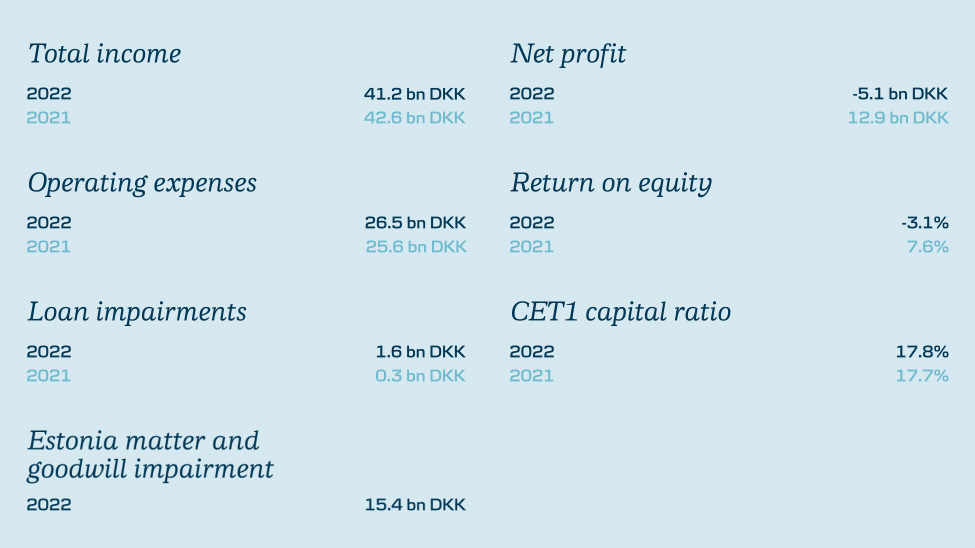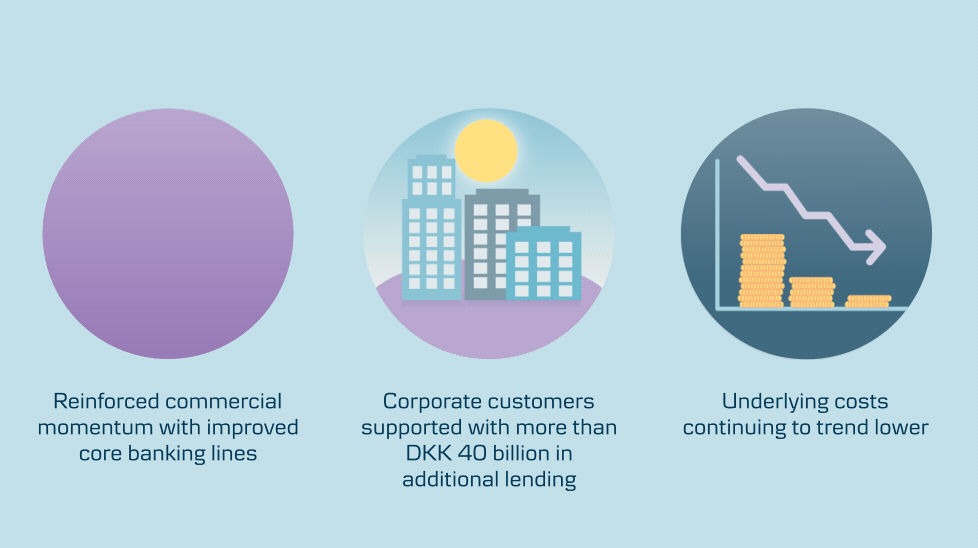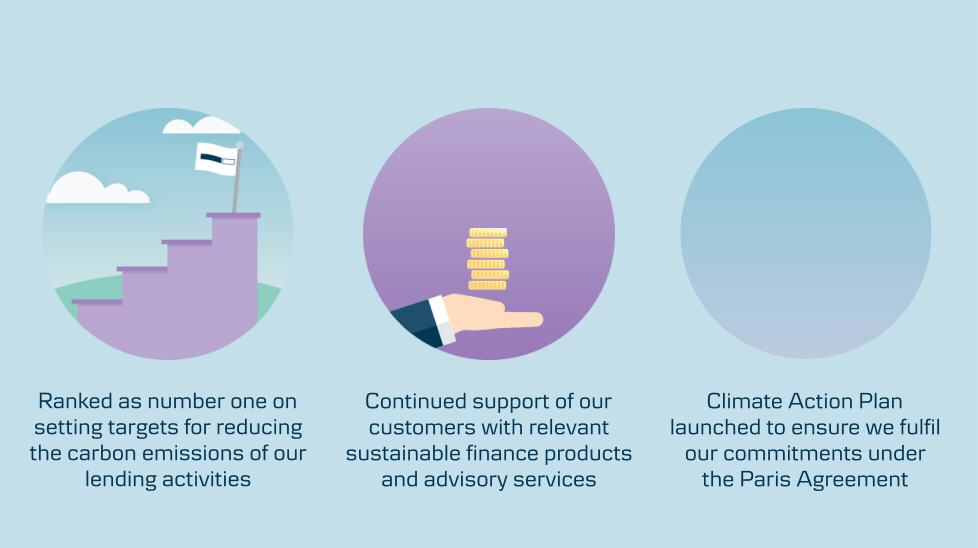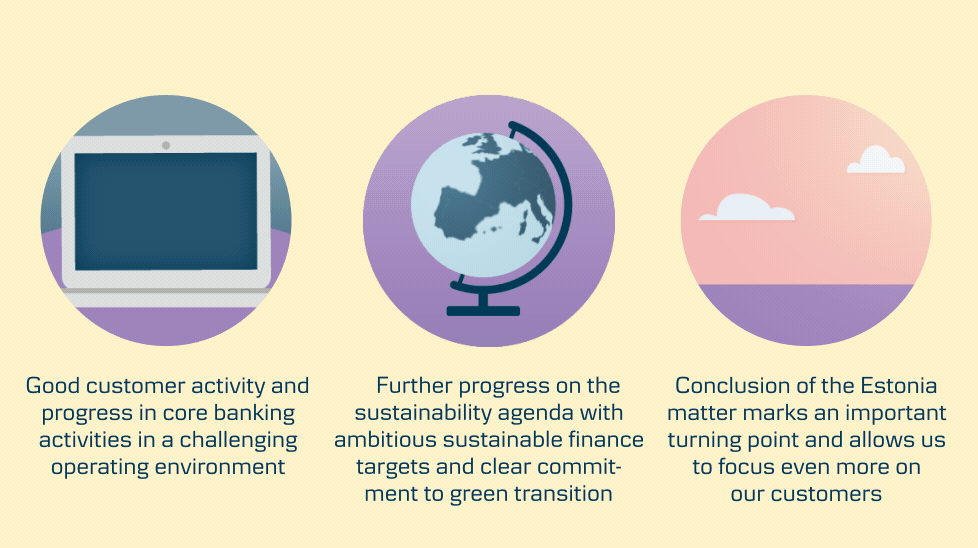Our customers and the economy
In a strong position to support customers in handling significant uncertainty
While the deteriorating macroeconomic outlook and higher interest rates are expected to impact both businesses and households, the quality of our lending book remained strong with low loan impairment charges that consisted primarily of increased management buffers. This ensures that we can continue to support our customers in navigating the difficult macroeconomic conditions.2022 was a year of almost unprecedented uncertainty and volatile markets that were caused, among other things, by intense geopolitical tension and soaring inflation, especially energy price inflation, which in turn led to a decline in real incomes and asset repricing as a result of monetary tightening. Consequently, our customers had to navigate the most challenging environment in decades. These conditions continued in the last quarter of 2022, which saw a continually deteriorating macroeconomic outlook, and mean that we will most likely see lower economic activity in 2023.
Towards the end of the year, however, there was increased risk appetite among investors in the financial markets, albeit from low levels, and some signs point towards both energy prices and the rate hikes by central banks having peaked, at least for now. In addition, labour markets and consumer spending in the Nordic countries remain resilient, providing a strong starting point for weathering the coming economic slowdown.
Financial review


Core banking activities continue to deliver good results
Throughout 2022, our business model delivered a reinforced commercial momentum, as our core banking lines improved, driven primarily by improved net interest income on the back of normalised interest rates from the central banks and positive trends in volumes. Among other things, the market share of bank lending in our business in Denmark increased throughout the year. Fee income was resilient, although weakening towards the end of the year, with especially activity-driven fees holding up well and good customer demand for our risk advisory solutions. In the fourth quarter of 2022, income lines related to financial markets continued to improve due to the more constructive market conditions.The rise in mortgage rates fuelled remortgaging activity in 2022, and this had a positive effect on fee income. Our market share of new mortgage lending increased from the level in 2021 despite lower customer activity in the housing market as well as declining house prices.
The demand for credit from corporate customers was particularly strong during 2022, as capital markets became more expensive and less accessible. Factors such as higher energy prices also contributed to an increased need for working capital. Danske Bank’s strong liquidity and capital positions enabled us to support customers across our home markets, and we thus supported our corporate customers with more than DKK 40 billion in additional lending.
Net trading income recovered in the second half of the year, as market conditions became more supportive. Income from insurance business also saw a negative effect from the financial market turmoil in 2022. The result stabilised towards the end of the year, driven by value adjustments, as the interest rate environment normalised. The underlying business is still strong, and we continue to see improvements in our health and accident business.
We saw underlying costs continuing to trend lower as a result of our efforts to increase efficiency. Total costs, however, continued to be impacted by high remediation costs given our efforts to close legacy issues. In August 2022, we communicated an accelerated solution to the debt collection case and stated that further sample checks related to the customer compensation model were needed. These sample checks confirm the validity of the model we proposed in August, and the work we have done has further reinforced the robustness of the model across different customer segments and has given us an even clearer picture of compensation levels. As a consequence, we decided to make an additional provision of DKK 310 million in the fourth quarter of 2022.
At the outset of the Better Bank plan, we had a clear ambition to simplify our business, improve efficiency, increase digitalisation and strengthen compliance, as well as to sharpen our commercial focus. 2022 was a year of many accomplishments, including the reorganisation of our Personal Customers and Business Customers units, significant progress with our remediation efforts and consistent steps towards fully digital banking solutions across our segments. Our focus is on delivering on our 2023 targets, and before we reach the end of the first half of 2023, we will give investors an update on our mid-term financial targets beyond 2023.
“Our core banking activities continued to deliver good results throughout the year, despite the low macroeconomic visibility and high volatility in the financial markets. Net interest income increased for the eighth consecutive quarter – and 14% year on year – as a result of increased lending, driven particularly by our corporate customers, and the normalised interest rates. Net trading income recovered in the second half of the year, despite a reduction in risk utilisation, as market conditions became more supportive. Our efforts to increase efficiency continued to result in a decrease in underlying costs, while the closing of legacy issues resulted in high remediation costs. We note the strong commercial momentum in our core banking activities, our efficiency gains as well as the clarity provided about our legacy issues, while the resolution of the Estonia matter of course significantly impacted the results. This progress makes us confident with regards to reaching our 2023 targets,” says Stephan Engels, Chief Financial Officer.
Sustainability

Maintaining our ambition to being a leader within sustainability
The financial sector plays an important role in the transition towards a more sustainable society, and at Danske Bank, we have continued to support our customers in their green transition with relevant sustainable finance products and advisory services. As we proceed with our ambition to be one of the leading banks in the Nordic countries for sustainable finance, we continued on our net-zero pathway.To support our customers in the transition, we set ambitious 2030 targets at the beginning of 2022 for carbon emission reductions related to corporate lending in the key oil and gas, shipping and utilities sectors. Building on this commitment, in January 2023, we published Danske Bank’s Climate Action Plan, which sets new Paris-aligned emission reduction targets for our financial activities as well as for our own operations. To ensure that we will fulfil our commitments under the Paris Agreement, these targets encompass our entire business and all of our activities. The new plan is based on the standards and guidance of the Science Based Targets initiative. With the new plan, we reinforce the commitment we have made to support and enable our customers’ sustainable transition journeys by continuing to develop our offerings across segments and by remaining at the forefront of this evermore important agenda.
Danske Bank has also taken a strong lead among international banks when it comes to helping customers to reduce their carbon emissions. A recent survey from the Bloomberg Intelligence research unit published in October 2022 ranked Danske Bank as number one among 54 international banks when it comes to setting targets for reducing the carbon emissions of our lending activities.
During 2022, we came closer to fulfilling our commitment to provide DKK 300 billion in sustainable financing by the end of 2023, as we increased the amount of sustainable financing from DKK 192 billion at the end of 2021 to DKK 273 billion at the end of 2022. Investments in the green transition increased from DKK 33.5 billion to DKK 37.7 billion, bringing us closer to our 2023 target of DKK 50 billion.
Also, by year-end 2022, we remained the leading Nordic arranger of sustainable bonds, and in Bloomberg’s global ranking for green bonds, we attained a ranking as no. 16.

Dividend for 2022
On 27 October 2022, Danske Bank made an additional provision of DKK 14.0 billion in relation to the Estonia matter. Consequently, the Board of Directors will propose to the annual general meeting in 2023 not to pay out dividend for 2022. Danske Bank’s dividend policy remains unchanged, targeting a dividend of 40-60% of net profit. Danske Bank has strong capital and liquidity positions, and the Board of Directors remains committed to our capital distribution policy.
Outlook for 2023
We expect net profit for 2023 to be in the range of DKK 15-17 billion.
“Our outlook is in line with our 2023 financial ambitions and is based on an expectation of growth in income from our core banking activities in 2023, driven by higher net interest income and our continued efforts to drive commercial momentum, while income lines related to financial markets are expected to recover from the levels in 2022 despite a high degree of uncertainty. Furthermore, we expect our continued focus on cost management to be reflected in lower costs despite inflationary pressure. Credit quality remains strong, and hence impairments are expected to increase primarily because of a weaker macroeconomic outlook that will affect model-driven impairments,” says Stephan Engels.
The outlook is subject to uncertainty and depends on economic conditions.
“Our outlook is in line with our 2023 financial ambitions and is based on an expectation of growth in income from our core banking activities in 2023, driven by higher net interest income and our continued efforts to drive commercial momentum, while income lines related to financial markets are expected to recover from the levels in 2022 despite a high degree of uncertainty. Furthermore, we expect our continued focus on cost management to be reflected in lower costs despite inflationary pressure. Credit quality remains strong, and hence impairments are expected to increase primarily because of a weaker macroeconomic outlook that will affect model-driven impairments,” says Stephan Engels.
The outlook is subject to uncertainty and depends on economic conditions.

Find report
Contact
Stefan Singh Kailay, Head of Media Relations
Tel. +45 45 14 14 00

Join conference call
Related news
.png?h=128&iar=0&w=128&rev=c0456076148343a69ec27218e9fa39aa&hash=5367D3AD7CFBE8E78181A6587FAB2790)


